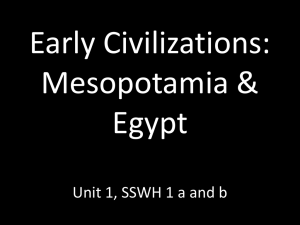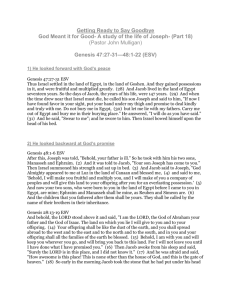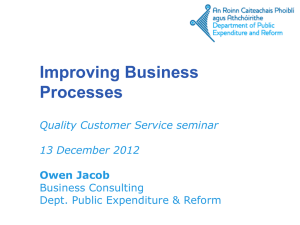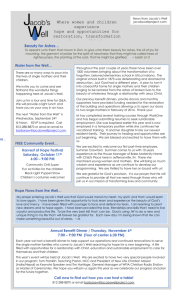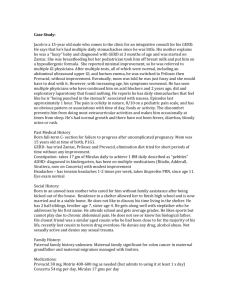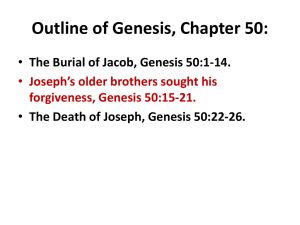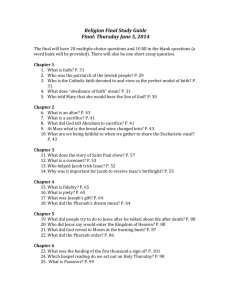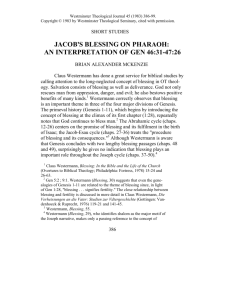ESUMC MS Lesson 20
advertisement
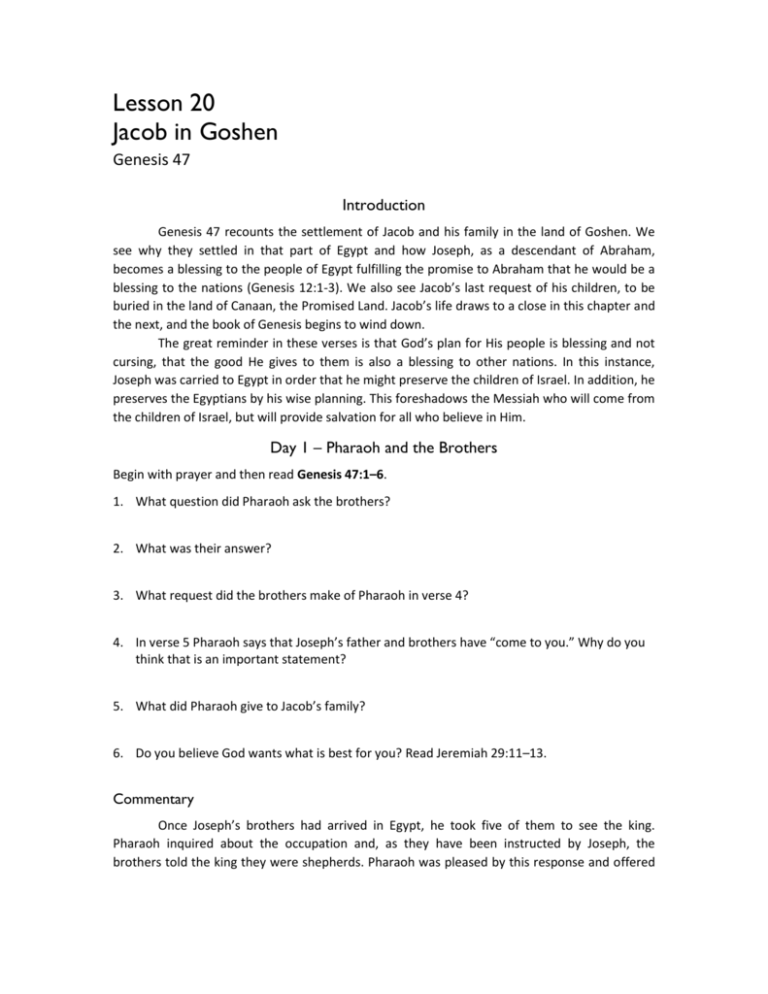
Lesson 20 Jacob in Goshen Genesis 47 Introduction Genesis 47 recounts the settlement of Jacob and his family in the land of Goshen. We see why they settled in that part of Egypt and how Joseph, as a descendant of Abraham, becomes a blessing to the people of Egypt fulfilling the promise to Abraham that he would be a blessing to the nations (Genesis 12:1-3). We also see Jacob’s last request of his children, to be buried in the land of Canaan, the Promised Land. Jacob’s life draws to a close in this chapter and the next, and the book of Genesis begins to wind down. The great reminder in these verses is that God’s plan for His people is blessing and not cursing, that the good He gives to them is also a blessing to other nations. In this instance, Joseph was carried to Egypt in order that he might preserve the children of Israel. In addition, he preserves the Egyptians by his wise planning. This foreshadows the Messiah who will come from the children of Israel, but will provide salvation for all who believe in Him. Day 1 – Pharaoh and the Brothers Begin with prayer and then read Genesis 47:1–6. 1. What question did Pharaoh ask the brothers? 2. What was their answer? 3. What request did the brothers make of Pharaoh in verse 4? 4. In verse 5 Pharaoh says that Joseph’s father and brothers have “come to you.” Why do you think that is an important statement? 5. What did Pharaoh give to Jacob’s family? 6. Do you believe God wants what is best for you? Read Jeremiah 29:11–13. Commentary Once Joseph’s brothers had arrived in Egypt, he took five of them to see the king. Pharaoh inquired about the occupation and, as they have been instructed by Joseph, the brothers told the king they were shepherds. Pharaoh was pleased by this response and offered the best of the land in Goshen to them. Because of Joseph’s faithfulness, his family was now able to enjoy the very best Egypt had to offer. God’s provision for the Israelites was productive land for their livestock and jobs for them taking care of the king’s livestock. God had richly blessed them with these provisions. As the text says, in Canaan the land was not capable of supporting their livestock. By the time God brings the children of Israel out of Egypt and restores them to Canaan the land is flowing with milk and honey and provides a bountiful harvest for them. God not only preserves the people in Goshen, He also ensures that the Promised Land is ready for their return several generations later. Day 2 – Pharaoh and Jacob Begin with prayer and then read Genesis 47:7–10. 7. Why do you think Jacob blessed Pharaoh twice? 8. What does Jacob say about his life? 9. Why do you think his life was so hard? Read Exodus 20:12. Commentary Once Pharaoh had granted permission to live in Goshen, Joseph brought his father to meet the king. The text tells us that Jacob blessed the king twice (vv. 7 and 10). This double blessing is another reminder of God’s promise to Abraham that his seed would be a blessing to the nations. The meeting was obviously for Jacob to thank Pharaoh for the privilege of staying in Goshen, but the writer focuses on Jacob’s response to a question posed to him by the king. Pharaoh asks how old Jacob is. Jacob responds, The years of my sojourning are one hundred and thirty; few and unpleasant have been the years of my life, nor have they attained the years that my fathers lived during the days of their sojourning. (Genesis 47:9) Unlike the patriarchs before him, Jacob lived a difficult and shortened life, though not short by today’s standards. Later in the Pentateuch the children of Israel will be taught that they are to honor their fathers and mothers and live long in the land (Deuteronomy 5:16). Jacob deceived his father in order to get the birthright and suffered because of his deceit. Earlier, Jacob’s wrestling match with the angel was a picture of his struggle in life, both with God and with man. Although Jacob knew the blessings of God as the son of promise, his sin of deceit caused him great consternation and an “unpleasant” life. This is a sad testimony to the effects of sin even in the life of the man or woman of faith. Day 3 – Joseph Saves the People Begin with prayer and then read Genesis 47:11–26. 10. Why do you think the author makes the point that Joseph purchased the Egyptians as slaves for Pharaoh? 11. Is there any thing in your life that you are a slave to other than God? 12. Are there any additions in your life that prevent you from doing the will of God? Commentary As the severe famine continued, Joseph made plans for sustaining the people. Although there was plenty of grain due to Joseph’s ingenious plan to store it up during the years of abundance, the people were running first out of food, then out of money to buy the food. So Joseph began taking livestock as payment for food. This provided for the people. Later, though, there was need to buy more grain and the livestock already belonged to Pharaoh due to the previous sale. This time the people of Egypt offered themselves as slaves to the king in return for food. Here is where there is great irony. Joseph, whose own enslavement eventually led to his protection from harm and rise to power in Egypt, was now taking all of Egypt captive, including the people, their livestock, and their land. In return he gave them all they needed to live: At the harvest you shall give a fifth to Pharaoh, and four-fifths shall be your own for seed of the field and for your food and for those of your households and as food for your little ones. (Genesis 47:24) The people were overjoyed to have been given seed to sow and as such to provide for their families’ needs. In response they said to Joseph, “You have saved our lives!” (v. 25). Joseph is indeed a savior-figure not only for the Hebrews but for the Egyptians as well. Again, we see the blessings of God on others because of the faithfulness of His servant. While the Egyptians were enslaving themselves to Pharaoh in exchange for food, God’s favor was seen on the Israelites: Now Israel lived in the land of Egypt, in Goshen, and they acquired property in it and were fruitful and became very numerous. (Genesis 47:27) The text tells us that the children of Israel were fruitful in Goshen and were multiplying. Of course, the author has in mind an earlier portion of Genesis where God instructed Adam and Eve to “be fruitful and multiply” (Genesis 1:28). God said the same thing to Noah when he emerged from the ark following the flood (Genesis 9:1, 7). And importantly, Isaac had prayed for Jacob, May God Almighty bless you and make you fruitful and multiply you, that you may become a company of peoples. (Genesis 28:3) Isaac’s prayer was answered. God did grant this request, and Jacob became a great nation while in Goshen. But of course, God had promised to Jacob that He would answer this prayer: I am God Almighty; be fruitful and multiply; a nation and a company of nations shall come from you, and kings shall come forth from you. (Genesis 35:11) God’s promise to Jacob had now become a reality. Jacob once again experienced God’s complete faithfulness to His promises. There was a second part to Isaac’s prayer on Jacob’s behalf: May He also give you the blessing of Abraham, to you and to your descendants with you, that you may possess the land of your sojournings, which God gave to Abraham. (Genesis 28:4) God had also promised to Jacob that He would answer this request as well: The land which I gave to Abraham and Isaac, I will give it to you, And I will give the land to your descendants after you. (Genesis 35:12) The next section of this chapter is a foreshadowing of God’s faithfulness to this promise as well. Day 4 – Jacob Nears Death Begin with prayer and then read Genesis 47:11–31. 13. Read Genesis 1:28 and 9:1. Why do you think the author told us that the Israelites “were fruitful and became very numerous”? 14. What request does Jacob make in verses 29–30? 15. Why is this request significant? 16. How does Joseph respond to this request? 17. Jacob’s request to be buried in Canaan was his acting with faith in God’s promise of the land. Are there any ways your actions demonstrate a failure to trust God’s promises to you? 18. If so, why do you think you are not trusting Him to keep His promises? 19. Read Luke 11:9–13. What does this tell us about God’s promises to you? Commentary When Jacob realized he would soon be dying he asked Joseph to promise that he would not bury him in Egypt. Jacob specifically requests to be buried in Canaan where his fathers were buried. By this he means Machpelah, the field that Abraham had bought to serve as Sarah’s burial site. This land, which Abraham rightly owned, was the first parcel of the Promised Land that was given to Abraham. This field was a down payment representing God’s promise of all the land that would belong to the descendants of Abraham. Joseph agreed to this request and Jacob worshiped God in response. God’s promise to Jacob in a vision to restore him to Canaan would be fulfilled as well (see Genesis 46:4). Conclusion God is faithful to His promises. That message cannot get old for the believer. When all appears lost, God is still faithful. When we are at our lowest point, God is still faithful. When the plan that God has is unseen, we must remember that God is still faithful. His promise to us of salvation and blessing in Jesus Christ is a promise we can know to be true. He will keep His Word, and that knowledge is what leads us to have hope.
